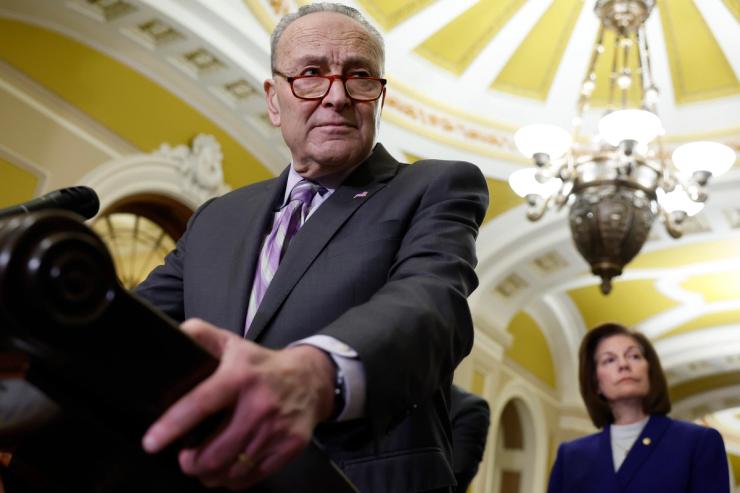The News
The Senate passed a foreign aid package with billions in funding for Ukraine and Israel in a 70-29 vote early Tuesday morning, sending the measure to the House where it faces significant hurdles.
Twenty-two Republicans voted for the measure, bucking a last-ditch campaign from some conservatives to kill it. Three Democrats voted against the measure.
The bill includes $60 billion in aid for Ukraine as it fights Russia’s invasion, $14 billion for Israel, and $10 billion in humanitarian aid, as well as funding for allies in the Asia-Pacific region to counter threats from China.
“Today we make Vladimir Putin regret the day he questioned America’s resolve and we make clear to others like China’s President Xi not to test our determination,” Senate Majority Leader Chuck Schumer, D-N.Y. said on the Senate floor immediately following the passage of the aid package. He also said the vote sent “a clear bipartisan message of resolve to our allies in NATO.”
The Senate package had the backing of Republican leader Mitch McConnell, R-Ky., one of the most ardent Ukraine supporters in Congress. “The Senate understands the responsibilities of America’s national security and will not neglect them,” he said in a statement Tuesday.
While the Senate passage represents a significant feat, it still faces an uphill battle in the House.
House Speaker Mike Johnson fired a warning shot Monday evening, issuing a statement that criticized the package for not addressing security at the U.S. southern border and suggesting the House would not vote on the measure as passed. Johnson has previously suggested he would break up the package and consider the measures separately, though it’s unclear whether that would guarantee a vote on Ukraine assistance.
“In the absence of having received any single border policy change from the Senate, the House will have to continue to work its own will on these important matters,” Johnson said. “America deserves better than the Senate’s status quo.”
In this article:
Know More
Tuesday’s vote — which took place at 5:15 a.m. — caps a weeklong drama that saw Senate Republicans reject a bipartisan border security package intended to unlock more Republican votes for assistance for Ukraine. Opposition to Ukraine aid is rising in the Republican Party, with some vocal opponents arguing that the U.S. should instead focus resources on domestic problems or threats from China. Over the weekend, former President Donald Trump indicated his opposition to the package, suggesting in a Truth Social post that it instead be structured as a loan.
Sen. Lindsey Graham, R-S.C., one of the chamber’s biggest defense hawks, surprised by announcing he would vote against the bill because it did not include border security measures. He also backed a call from Trump to structure the package as a loan to Ukraine, despite the fact much of the money goes to the Pentagon to replace weapons used by Kyiv.
Ukraine aid opponents including Sen. Rand Paul, R-Ky. sought to delay passage of the bill with speeches on the floor. Sen. J.D. Vance, R-Ohio circulated a memo on Monday arguing that the bill could lead to another Trump impeachment if he becomes president and seeks a pause in funding to end the war, because some of the funding expires nine months after the start of the next presidential term.
A senior GOP aide dismissed Vance’s claim. “This bill is about forcing the current president to get the Ukrainians the weapons and aid they need to make it through 2024,” the aide said. “A standard period of availability for appropriations is not an impeachment kill switch for a future president or whatever conspiracy theory is being floated at the last minute.”
Vance was among a trio of Republicans who participated in an X Spaces with Elon Musk and David Sacks on Monday night to rail against the foreign aid bill. Sen. Ron Johnson, R-Wis. said Ukraine could not win the war against Russia and that his colleagues were “living in a fantasy world” for believing otherwise. Musk agreed. “This funding does not help Ukraine,” he said. “Prolonging the war does not help Ukraine.”
A growing number of House Republicans have opposed further aid to Ukraine, but Kyiv still has some vocal advocates in the lower chamber — including House Foreign Affairs Committee Chairman Michael McCaul, R-Texas and House Intelligence Committee Chairman Mike Turner, R-Ohio.
“We have to get this done,” Turner told Politico following a recent trip to Ukraine. “This is no longer an issue of, ‘When do we support Ukraine?’ If we do not move, this will be abandoning Ukraine.”
The View From Ukraine
Ukrainian President Volodymyr Zelenskyy immediately thanked Schumer, McConnell, and other senators who voted in favor of the aid package Tuesday.
“For us in Ukraine, continued US assistance helps to save human lives from Russian terror. It means that life will continue in our cities and will triumph over war,” Zelenskyy posted on X following the vote. “American assistance brings just peace in Ukraine closer and restores global stability, resulting in increased security and prosperity for all Americans and all the free world.”
Notable
- Some House members are discussing an obscure procedure known as a “discharge petition” to get the foreign aid bill on the House floor. It would need a majority support among House members, which could be difficult given growing Republican opposition to Ukraine funding and progressive angst over the way Israel is conducting the war against Hamas in Gaza.
- The European Union earlier this month agreed to provide Ukraine with 50 billion euros ($54 billion) in financial support, defeating an objection from Hungary.


